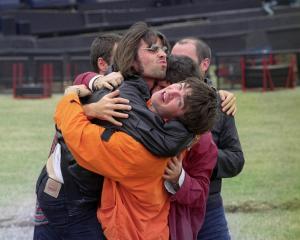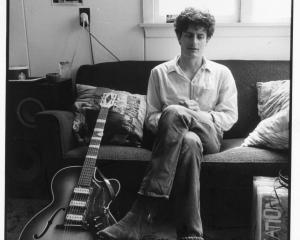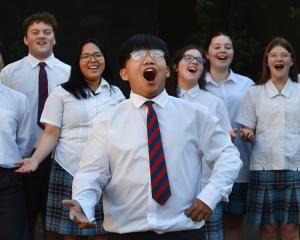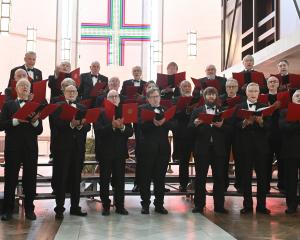
Whether it’s Bach, jazz, electronics or classical Indian, cellist Matthew Barley is happy to give it a go.
In fact the bigger the unknown, the more keen he is, even it does mean being thrown in the deep end like he was in his first improvisation concert with classical Indian music great Amjad Ali Khan at the Royal Festival Hall in London.
"Amjad is such a big name and the Royal Festival Hall is totally sold out, with two or three thousand people. It was the most terrifying occasion but also a great way to begin as when you are thrown in the deep end odds are you tend to respond."
It is answering calls like that request that have shaped Barley’s career as opposed to any great career plan.
"It has been quite random in sense. Over my 35-year career I’ve picked up the phone or answered emails responding to requests with ‘yes’ or ‘I can’t fit it in’. There has been no over-riding plans, there is no greater intelligence looking after it in the greater scheme of things."
It has meant he has performed in about 60 countries around the world in some of the top concert halls, such as London's Wigmore Hall, Royal Albert Hall, Amsterdam’s Concertgebouw, Kumho Hall in Korea, Pablo Casals Hall in Tokyo, The Rudolfinium in Prague and the Teatro Colon in Buenos Aires and has appeared with the BBC Scottish Symphony and Philharmonic, Frankfurt Radio Symphony, Swedish Chamber , Melbourne Symphony, Hong Kong Sinfonietta, Netherland Radio Symphony , Czech Philharmonic, Vienna Radio Symphony, Kremerata Baltica, and Royal Liverpool Philharmonic.
In 1997 Barley founded Between The Notes, a performance and education group that has appeared at the Sydney Opera House, the Royal Opera House (with the Royal Ballet) and the International Symposium of Contemporary Music in Hong Kong.
In 2005 the group took the lead role in a devised work, Invisible Lines, which culminated in a BBC1 live-television performance at the Royal Albert Hall for the Proms, alongside players from the BBC Symphony Orchestra.
Then in 2013 Barley completed an "astonishing" 100-event United Kingdom tour celebrating English composer Benjamin Britten – the itinerary included venues as diverse as a Victorian swimming pool, an ancient yew forest, a lighthouse, a barn and the Wigmore Hall in London, as well as a host of educational projects in schools, a hospice, an old people’s home and a prison.
"Different seasons come out in varying different ways. A few seasons ago I remember playing Dvorak, Beethoven and Bach constantly for several months and then I might find myself for months improvising and playing with jazz musicians.
"It really changes around a lot and that is what I really enjoy about my career."
His latest trip to New Zealand sees him tour the country with pianist Stephen De Pledge for Chamber Music New Zealand (CMNZ) with a programme of classical music. They will play some of Barley’s favourite feel good, uplifting music - Robert Schumann’s Adagio And Allegro, Op 70, Nadia Boulanger’s Three Pieces For Cello And Piano, Ludwig Van Beethoven’s Sonata For Piano And Cello No. 2 In G Minor, Op 5, No 2, Johannes Brahms’ Sonata For Piano And Cello No. 1 In E Minor, Op 38, Sergei Rachmaninov’ Vocalise, Op 34, No 14 and Dmitri Shostakovich’s Suite from Cheryomushki.
He has been looking forward to his tour with De Pledge whom he has known for around 20 years since they played together on his second CD Reminding and they have continued to perform together over the years.
"He’s wonderful musician. We’re definitely seasoned chamber music partners which always makes a difference. Rehearsals with Stephen are always easy as we seem to have the same goal in mind musically."
While in the country he has also adjudicated the finals of CMNZ National Chamber Music competition and performed with the Christchurch Symphony Orchestra.
"It’s my fifth trip here so I‘m beginning to feel quite at home here."
When he is not playing classical music, he teaches, workshops and collaborates in improvisation.
It was something he was first exposed to as a student although he admits it was not that successful.
"I was absolutely terrible at it but at same time rather fascinated by it and from then I’d always jump at chance to have a jam with musician of similar mind."
However, it was not until 2000 and the concert with Khan that he began to take improvisation seriously professionally.
"That was the start, I absolutely love it, it’s very exciting. There is something about the process which you even surprise yourself."
Barley believes in being true to the concept of improvisation.
"I’m quite rigorous with improvisation in that I don’t let myself plan in advance I really do trust the moment its amazing to see what comes out sometimes."
The music that flows in those situations is a culmination of everything he has heard in his life, the people he has met, the things he has done and the audience and concert hall, he says.
"It draws together so many things. It’s a truly fascinating cocktail."
He recently got sent a 10th anniversary remix to an improvised album Face To Face he played on with Alex Heffes (soundtrack to Last King of Scotland) at an overnight lock-in at London’s Tate Modern.
"It’s a funny experience listening to improvisation you did 10 years ago. It’s amazing how much remember, I feel like I’m playing it again. It was a strange experience."
Barley’s influences can be traced back to his first music love - the Beatles. Although he was seven when he discovered the cello and has not looked back.
"It’s deeply in my bones."
Over the years his interest in music has widened and he tries to educate himself in different genres including free jazz, art hip-hop. He loves Indian music and jazz and listens to a lot of pop music.
His favourite thing to do is put his phone on shuffle - he has 14,000-odd songs on it - and see what plays.
"I always get surprised."
Barley believes good quality music whatever the genre has the same principals at heart. He has been listening to the work of Jay Dilla, an American record producer who died young.
"He was enormously talented guy, not well known, not a big name but Dr. Dre and Snoop Dogg sight him as being the most talented."
The ways Dilla played around with material was very similar to the way Beethoven did, he says.
"On the face of it that is almost comical, but the way they both play with music material, the way they take simple music material and examine it from 100 different angles, how they can pull it out of shape, how they can vary it and develop it is basically the same instinct.
The more good quality music a person listens to, the more you learn.
"The principals of music definitely are universal."
To see:
CMNZ presents Barley & De Pledge - Beethoven & Brahms, Glenroy Auditorium, August 19, 7.30pm to 9.20pm.











